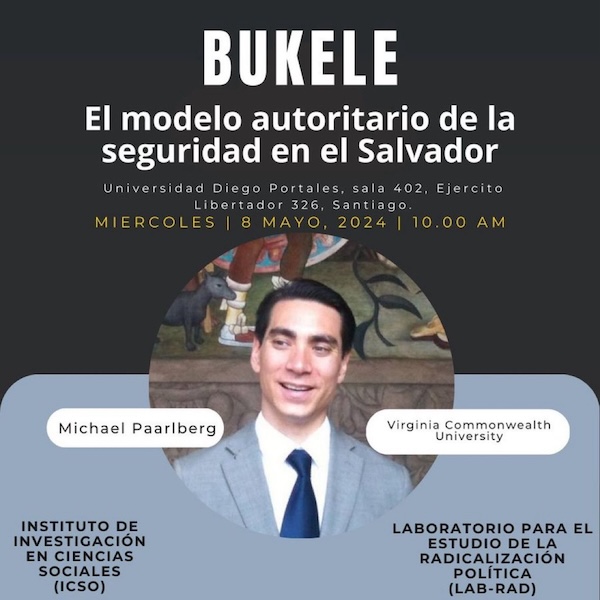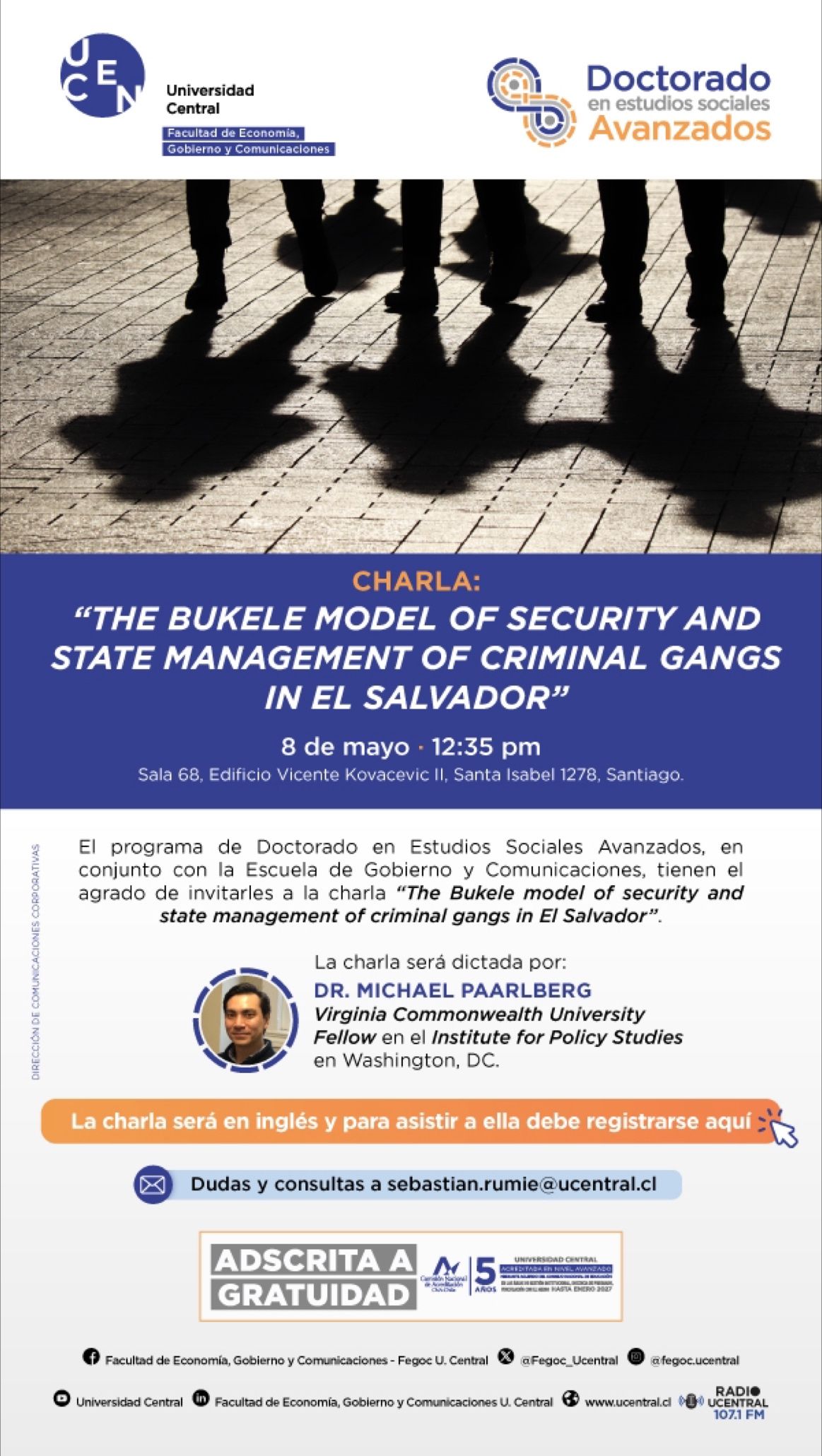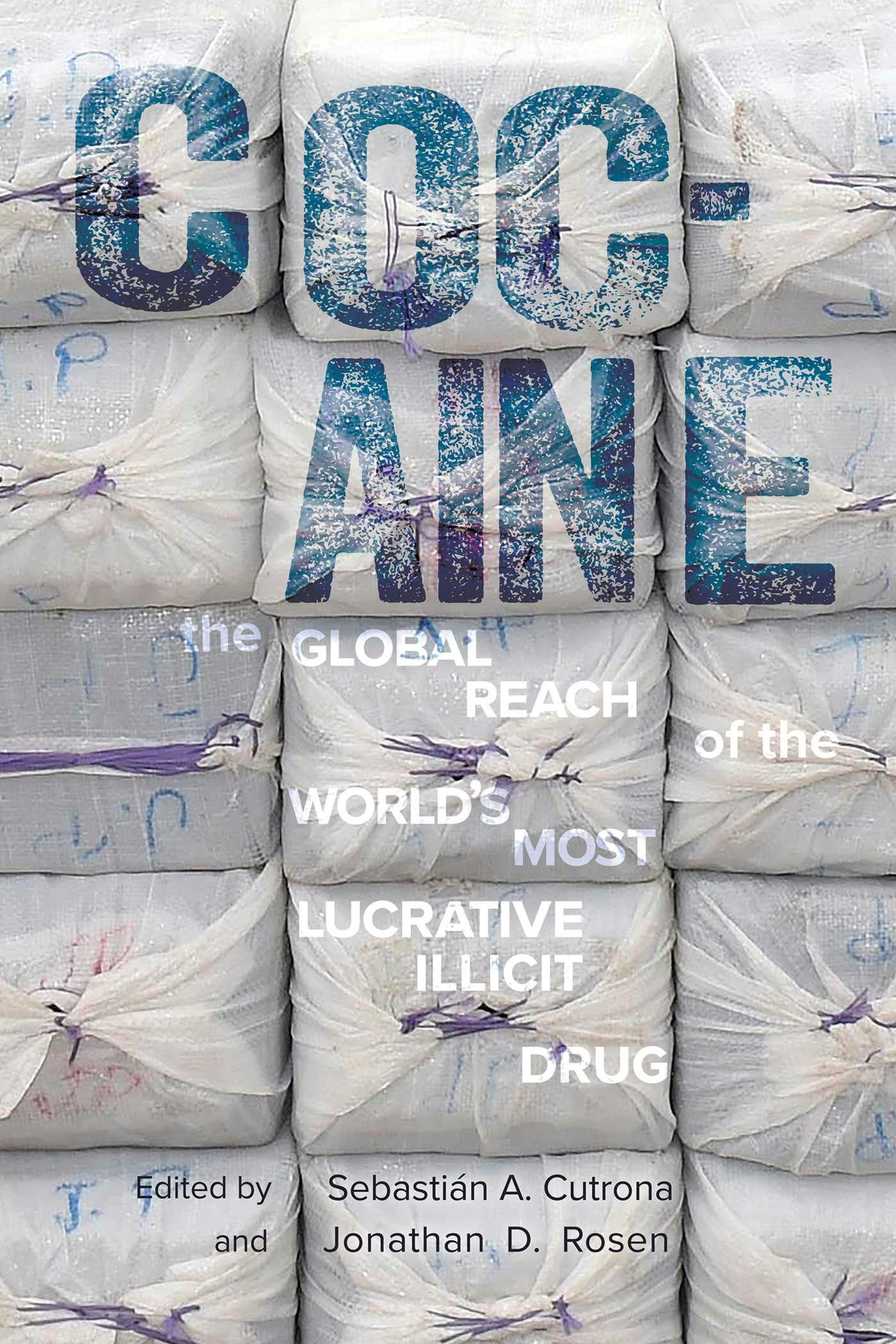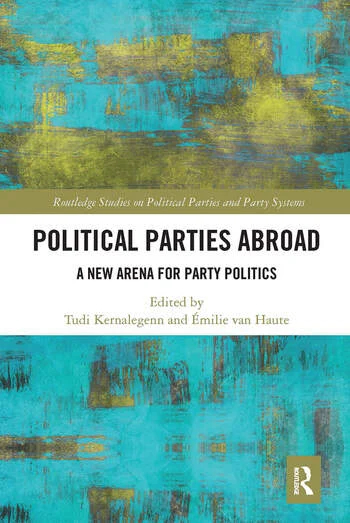Michael Ahn Paarlberg
Senior Nonresident Fellow, Center for International Policy
Associate Fellow, Institute for Policy Studies
Michael Ahn Paarlberg, Ph.D., is an associate professor of political science at Virginia Commonwealth University, a senior nonresident fellow with the Center for International Policy, and an associate fellow with the Institute for Policy Studies who studies migration and security issues in Latin America and the US. He was previously a postdoctoral fellow with the Center for the Study of Ethnicity, Race and Immigration at the University of Pennsylvania.
Paarlberg was the Chief Latin America Policy Adviser to the Bernie Sanders campaign in 2020. A former journalist for the Guardian, he regularly publishes his work in news outlets such as Foreign Policy, Slate, El Faro, and the Washington Post.
You can reach him by email here.
Profiles and interviews: El Diario | CNN Chile | IQ Latino | Frank News | The Fire These Times.
Scholarship
I am a scholar of the politics of migration and security, with a focus on Latin America. My research falls broadly in two categories: transnational political engagement by diaspora communities, and transnational crime. My scholarship has been published in the journals Comparative Politics, Comparative Migration Studies, International Migration, Journal of Ethnic and Migration Studies, Urban Affairs Review, Representation and in a number of edited volumes. My book manuscript is a comparative study on transnational electoral campaigning and voting within the diaspora electorates of the Dominican Republic, El Salvador, and Mexico. I also serve as an expert witness in immigration and asylum cases involving Latin American security issues. You can find my CV here.
Academic Publications
O’Brien, Benjamin Gonzalez; Collingwood, Loren; Paarlberg, M., & Tafoya, Jordin. (2025). The Sanctuary Scale: Measuring Immigrant Protections in Cities of Refuge. International Migration, 63(5).
O’Brien, Benjamin Gonzalez; Collingwood, Loren, & Paarlberg, M. (2023). Sanctuary Policies and the Influence of Local Demographics and Partnership. Urban Affairs Review, 60(1), 49-72.
Paarlberg, M. (2022). Transnational Gangs and Criminal Remittances: A Conceptual Framework. Comparative Migration Studies, 10(24), 1-20. (PDF available here).
Paarlberg, M. (2022). Migration and Democracy: How Remittances Undermine Dictatorships. (Book review.) Journal of Race, Ethnicity and Politics.
Paarlberg, M. (2020). “Hometown Associations and Parties as Vehicles for Mexican Electoral Campaigns in the US”. Representation, 59(3), 403-422.
Paarlberg, M. (2019). “Competing for the Diaspora’s Influence at Home: A Case Study of El Salvador.” in The Microfoundations of Diaspora Politics, edited by Alexandra Délano Alonso, and Harris Mylonas.
- Republished in: Délano Alonso, A. & Mylonas, H. (2021). The Microfoundations of Diaspora Politics. Routledge.
Paarlberg, M. (2017). Transnational Militancy: Diaspora Influence over Electoral Activity in Latin America. Comparative Politics, 49(4), 463-482.
- Download the data set for this research here, at about 50 MB.
- Honorable mention, best journal article, American Political Science Association Migration and Citizenship section 2018.
Paarlberg, M. (2016) “Day Laborers and Low-Wage Immigrant Workers..” Huerta, Iglesias-Prieto, and Brown, eds. Contemporary Issues for People of Color: Surviving and Thriving in the U.S. Today: Immigration. Greenwood.
Policy Reports
Paarlberg, M. (2021). Gang Membership in Central America: More Complex than Meets the Eye. Migration Policy Institute.
Paarlberg, M. (2019). How a Fake Gang Crisis in the US Helps Fuel a Real One in Central America. The Duke Center for International Development.
Paarlberg, M. (2018) Mexico’s Diaspora Electorate. Wilson Center.
Paarlberg, M. and Sameera Hafiz (2017)The Human Trafficking of Domestic Workers in the United States. Institute for Policy Studies and the National Domestic Workers Alliance.
Paarlberg, M., Ari Schwartz, Michael Wasser, and Merrit Gillard (2015) Unpredictable, Unsustainable: The Impact of Employers’ Scheduling Practices in D.C. D.C. Jobs with Justice and the D.C. Fiscal Policy Institute (PDF here).
Paarlberg, M., David Madland (2008) Making Contracting Work for the United States: Report on Labor Standards Among Federal Contractor. Center for American Progress. See coverage in The Washington Post: Joe Davidson’s Federal Diary, Dec. 10, 2008.
Work in progress
“Voting Here and There, Differently: Divergence as Strategy in Migrant Political Engagement.” with Gulcan Saglam (under review).
“Why Do Emigrants Vote? Evidence from a Transnational Voter Mobilization Experiment.” with Elizabeth Iams Wellman.
Op-Eds
Here is a list of op-eds I’ve published over the years. Op-eds published in the Guardian are available through my Guardian author page.
Paarlberg, M. (2026). The US Can’t Treat Venezuela Like Panama. The New Statesman.
Paarlberg, M. (2025). Trump’s Wag the Dog Moment. International Policy Journal, Center for International Policy.
Paarlberg, M. (2025). The Palestinians in El Salvador. Interactive Encyclopedia of the Palestine Question, Institute for Palestine Studies.
Paarlberg, M. (2025). El Salvador, Trump, and The Transnational State of Exception
Paarlberg, M. (2024). Demystifying the Border Crisis. Institute for Democracy, Pluralism, and Community Empowerment at Virginia Commonwealth University.
Paarlberg, M. (2024). Venezuela’s people, not government, deserve solidarity. Center for International Policy.
Paarlberg, M. (2022). Why El Salvador’s mass arrests won’t lower the murder rate. Washington Post.
Paarlberg, M. (2022). Latin America’s Pink Tide Is an Opportunity for Washington. Foreign Policy.
Paarlberg, M. (2022). Why the “Cool Dictator” of El Salvador Went All-In on Bitcoin. Slate.
Paarlberg, M. (2022). The Emerging Gang State in El Salvador. Global Americans.
Paarlberg, M. (2022). El emergente estado pandilla en El Salvador. El Salvador.
Paarlberg, M. and Ricardo J. Valencia (2021). The elections in El Salvador could make or break Biden’s Central America policy. Washington Post.
Paarlberg, M. (2021). Why Is America Cooperating With Militaries Running Criminal Rackets? Foreign Policy.
Paarlberg, M. (2021). “The US Approach to El Salvador’s Authoritarianism Must Be Bold.” Univision.
Paarlberg, M. (2020). El Salvador’s president sent troops to occupy the legislature. Here’s what’s going on. Washington Post.
Paarlberg, M. (2020). “China was already winning over the US’s neighbors. Trump’s COVID-19 response just makes Beijing’s job easier.” Business Insider.
Paarlberg, M. (2020). “EEUU, una presidencia pandémica en un año de elecciones.” Barcelona Centre for International Affairs Anuario Internacional.
Paarlberg, M. (2019). It’s not just a ‘coup’: Bolivia’s democracy is in meltdown. Washington Post.
Paarlberg, M. and Teófilo Reyes (2018) Paying tipped workers better wouldn’t lead to fewer restaurant jobs. Washington Post.
Paarlberg, M. (2018). “Agricultural Cooperatives: Opportunities and Challenges for African American Women in the South.” Institute for Policy Studies.
Paarlberg, M, and Reyes, T. “New York’s Experience after the Tipped Minimum Wage Increase.” Institute for Policy Studies and Restaurant Opportunities Centers United.
Paarlberg, M. (2018) Cómo se corteja el voto de la diáspora salvadoreña. El Faro.
Paarlberg, M. (2017) Don’t believe the Trump administration: MS-13 is not ravaging the United States. Washington Post
Paarlberg, M. (2015) This is why the two leading candidates for Guatemala’s presidency came to the U.S. to campaign. Washington Post.
Paarlberg, M. (2015). “A Recent Study Says Unionized Companies Actually Pay Less. The Truth Is a Bit More Complex.” In These Times.
Paarlberg, M. (2014). “The Pinochet Myth is Alive and Well Among Pundits Who Write About Egypt.” The New Republic.
Media Coverage
Drawing on my background as a former reporter, I frequently collaborate with national and international media to share my findings. My work has been featured in outlets such as Forbes, The New York Times, CNN, Insight Crime, and Bloomberg, among others. You can also visit my op-eds page for articles I have authored, many of which have appeared in these same outlets.
Maduro indicted - BBC News
The Truth about Venezuela
2026
(2026, January 23). Venezuela y Cuba están en la mira de Trump: cómo queda ahora Nicaragua ante la debilidad de sus mayores aliados. CNN en Español.
(2026, January 15). Trump to meet Venezuelan opposition leader, who vowed to share Nobel Prize. ABC News.
(2026, January 7). Maduro indicted. BBC News.
2025
Tessa Stuart. (2025, July 17). Human Rights Defenders Are Fleeing El Salvador as Bukele Cracks Down. Rolling Stone.
José Olivares. (2025, May 23). Trump administration trying to dismiss MS-13 leader’s charges to deport him. The Guardian.
Jacob Sugarman. (2025, May 9). The Post-Future Has Arrived in Argentina—and It Looks Remarkably Like the Past. The Nation.
(2025, April 15). US has responsibility to return MD man from El Salvador: Expert. abcnews.
Oscar Forsberg (2025, March 25). Därför lämnade Jeffrey Goldberg chatten. aftonbladet.
Patrick J. McDonnell, Kate Linthicum, Mery Mogollon, Nelson Rauda. (2025, March 23). They were called gang members and deported. Families say their only crime was having tattoos. Los Angeles Times.
Jessica García. (2025, March 22). Hay una transnacionalización del régimen de excepción, dice experto. elsalvador
Nelson Mauricio Rauda Zablah. (2025, March 18). With Venezuelan deportations, is Trump taking a page from El Salvador’s playbook?. csmonitor.
2024
Javier Biosca Azcoiti. (2024, November 29). Trump intentó derrocar a Maduro, pero ahora el petróleo de Venezuela puede hacerle cambiar de opinión. eldiario.
(2024, November 10). Trump está “dispuesto a hacer tratos con líderes autoritarios” si frenan la migración: Michael Paarlberg. Focos TV. (Video below.)
Magaña, Yolanda. (2024, November 4). Trump or Harris, the effects of the US election in El Salvador: the views of four experts. El Mundo.
Décima, Juan. (2024, November 2). “Milei is all in for Trump. Is that a sound bet?.” Buenos Aires Herald.
Offereins, Addie. (2024, September 17). Venezuelan street gang terrorizing U.S. migrant communities. WNG.
Padgett, Tim. (2024, September 6). “Is Venezuela Changing How the Left Responds to the Dictatorial Left?” WLRN.
Granger, Max. (2024, August 25). “Is Nicaragua’s Dictatorship Nearing Its End?” Foreign Policy.
Azcoiti, Javier Biosca. (2024, August 6). Michael Paarlberg, exasesor de Sanders para América Latina: “El Gobierno de Maduro es un lastre para la izquierda”. El Diario.
Stein, Jeff and Cocco, Federica (2024, July 25). “How Four U.S. Presidents Unleashed Economic Warfare Across the Globe.” Washington Post.
Mitú Daily. (2024, February 7). What does El Salvador Want? Mitú Daily.
Marcelo Rochabrun. (2024, February 2). A Brutal Crime Crackdown Is Emboldening Leaders Across Latin America. Bloomberg.
Denni Portillo. (2024, February 1). Catorce congresistas estadounidenses preocupados por elecciones en El Salvador. La Prensa Gráfica.
Carin Zissis and Chase Harrison. (2024, January 25). LatAm in Focus: Online Reach and Expat Votes in El Salvador’s Election. AS/COA.
2023
Elias Ferrer. (2023, September 27). Tide Turns To Favour Venezuela Economic Sanctions Relief. Forbes.
Megan Janetsky and Fernanda Pesce. (2023, March 23). War on gangs forges new El Salvador. But the price is steep. AP News.
Steven Dudley. (2023, February 9). Is Nayib Bukele’s ‘Iron Fist’ in El Salvador Working? Insight Crime.
Tibisay Zea. (2023, February 8). Lula and Biden will meet in Washington. The World.
Tibisay Zea. (2023, February 1). The new ‘pink tide’ in Latin America: Is it an opportunity or a threat to the US? The World.
2022
KBS 세계는지금. (2022, October 8). 엘살바도르 갱단과의 전쟁, 그 이면의 진실. KBS World Report.
Brendan Rascius. (2022, September 21). 2 million migrants were encountered at border in past year. Where are they coming from?. Miami Herald.
Carmen Rodriguez. (2022, July 21). ¿Cómo afectará la inflación al envío de remesas desde Estados Unidos? El Tiempo Latino.
Al Jazeera English. (2022, June 8). How is a ‘state of exception’ changing El Salvador? Al Jazeera.
(2022, May 18). Chaos Rules: Michael Paarlberg on diaspora communities, the Northern Triangle, and optics. Frank news.
Fernanda Echavarri. (2022, April 14). The 10,000 Ukrainians Just Processed at the Border Show the US Government Can Do Better. Mother Jones.
(2022, February 16). Gangsters Movie Night 4 Hands Of Stone. The Racket.
2021
Zeeshan Aleem. (2021, December 31). Why Kamala Harris’ cozy relationship with corporations is worrying. MSNBC.
Denni Portillo. (2021, December 9). “Ya se había anunciado con antelación”: Sobre negociaciones del Gobierno con pandillas. La Prensa Gráfica.
Jeff Ernst. (2021, November 26). Honduran election excludes diaspora votes, could determine outcome. Univision.
Eduardo Ramirez. (2021, November 12). Michael Paarlberg: Analysis of El Salvador and the effects of the Nayib Bukele presidency. Iqlatino.
Carlos Chica. (2021, October 20). Nayib Bukele: el autodenominado “Emperador de El Salvador”. Radioacional.
Carmen Rodriguez. (2021, October 13). El Salvador ha pagado $3.2 millones por lobby en Estados Unidos. La Prensa Gráfica.
Al Jazeera. (2021, September 14). Is El Salvador’s democracy under threat? Al Jazeera.
Denni Portillo. (2021, July 3). Postura de Bukele ante la Lista Engel podría provocar más sanciones. La Prensa Gráfica.
Ricardo J. Valencia. (2021, June 21). Want to Counter Authoritarianism in Central America? Follow the Money. Foreign Policy.
Eric Kolenich. (2021, May 28). Virginia is making college education cheaper for noncitizens. But this 21-year-old L.C. Bird grad got left out. Richmond.
(2021, May 21). Las relaciones entre EEUU y El Salvador son las peores desde la guerra civil. Diario Elmundo.
Alex Papadovassilakis. (2021, May 10). Pandemic Spending Immunity Deepens El Salvador Corruption Concerns. Insight Crime.
Alex Papadovassilakis. (2021, April 2). In El Salvador, a New Security Minister With a Dubious Past. Insight Crime.
Denni Portillo. (2021, March 4). Ulloa usa lobista para protestar por artículo. La Prensa Gráfica.
Ricardo Valencia. (2021, February 10). Los congresistas que envían cartas a Bukele tienen más poder de lo que él admite. El Faro.
Sebastian Fest. (2021, January 9). Qué piensa Juan González, el hombre de Biden para América Latina, sobre Maduro, el muro con México y la relación con Argentina, Brasil y Colombia. Infobae.
2020
Guena Rod. (2020, September 15). Interview with Michael Paarlberg. Facebook.
Travis Waldron. (2020, March 17). Bernie’s Approach To Latin America’s Socialist Leaders Wouldn’t Be That Radical. Huff Post.
2019 and older
Kirk Semple. (2019, September 25). Migration Likely to Top Agenda When Trump Meets El Salvador’s Bukele. New York Times.
La República. (2018, September 17). Adiós al mito: Pinochet no mejoró la economía chilena. La Republica.
(2018, September 14). Académico estadounidense derrumba el mito de que Pinochet mejoró la economía chilena. CNN Chile.
Thomas Moriarty and Matt Gray. (2018, August 26). How big of a threat is the MS-13 gang in N.J.? The answer is complex NJ.com.
Kevin Krause. (2018, July 13). Dallas feds say they busted violent MS-13 gang members who attacked rivals with machetes and shotguns. Dallas News.
Susan Milligan. (2018, June 21). Is Raising Wages for Tipped Workers Worth It? US News.
Tyrone Richardson. (2018, May 17). Unions Join Effort to Unseat House Republican Dave Brat. Bloomberg Law.
Rising Up With Sonali. (2018, February 26). SCOTUS Hears Arguments in Case That Could Upend Unions. Risingup With Sonali.
Robert Downen. (2018, January 5). MS-13 gang brutality grabs headlines while its influence in Houston and U.S. may be waning. Houston Chronicle.
Phillip Martin. (2017, November 15). The Gangs Of Nantucket: Fear And Politics. WGBH.
Seth McLaughlin. (2017, October 19). Ed Gillespie ties MS-13 gang to sanctuary city, immigration debate. Washington Times.
Jill Abramson, Steven W Thrasher, Michael Ahn Paarlberg, and Jamie Weinstein. (2017, January 20). ‘He’s already let America down’: the reaction to Trump’s first speech as president. The Guardian.
Télam. (2017, January 20). “El legado de Obama está en peligro”, advirtió el periodista estadounidense Paarlberg. Télam.
Bos, Emiliano. (2016, March 15). La Cuba americana di Marco. RSI.
Michael Ahn Paarlberg
Senior Nonresident Fellow, Center for International Policy
Associate Fellow, Institute for Policy Studies
Teaching
My approach to teaching is to make course material as relevant to students as possible, whether in a large introductory lecture class, discussion seminar, or methods skill-building course. I believe that a model emphasizing discussion and reflection over memorization offers the best opportunities for student participation and knowledge retention. Emphasizing that political science is political analysis, not political opinion, I train students in different analytical approaches and statistical methods In order to test popular assumptions about the world.
Courses
Introduction to Comparative Politics (POLI 109)
An intro-level overview of the fundamental concepts of the political science subfield of comparative politics: examining how political institutions and the exercise of power operate in different countries, using the scientific method. This course pays special attention to different models of governing regimes, economic development, identity, social welfare, and political violence.
Research Methods (POLI 320)
An upper level survey of social science research methods and statistics with an emphasis on skill building, this course teaches the foundations of causal inference and a variety of quantitative research skills including regression analysis, data visualization, and web scraping of APIs, using the coding language R.
Latin American Politics (POLI 353)
A discussion seminar of the contemporary politics of Latin America and the Caribbean, with a thematic focus on topical issues including democracy and authoritarianism, crime, corruption, and economics using case studies of Argentina, Bolivia, Brazil, Chile, Colombia, Cuba, the Dominican Republic, El Salvador, Guatemala, Haiti, Honduras, Mexico, Nicaragua, and Venezuela.
Politics of Immigration (POLI 391)
A discussion seminar looking at migration in a comparative and global context, grounded in the US but examining immigration rules, migration issues, and diaspora communities in countries around the world. This course draws on different countries’ experiences with migration including with issues of citizenship, borders, asylum and refugees, immigration law enforcement, remittances, climate migration, visas, and the agency of migrants themselves as political actors.
Public Lectures in Chile







.png)



